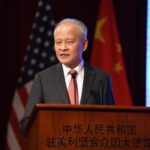Despite some Indians calling for boycotting Chinese products, Chinese businesses investing there are mostly positive, pinning hope on its growing market.
Recent media reports said that most high-profile investments by Chinese companies are progressing, albeit slightly delayed from their original schedule, after the two countries’ relations have plunged after a deadly border clash in June.
Chinese auto company Great Wall Motors (GWM) is approaching Indian authorities to push ahead with its plan to launch its vehicle plant in India next year, with production in its Talegaon factory, which the company acquired from General Motors, India’s Economic Times reported.
The Indian government introduced new rules in April that make advanced government clearance mandatory for investment from countries that shares its land border, explicitly targeting China.
The GWM deal, worth $500 million, is at risk of being ditched following the state government of Maharashtra’s decision to put the project on hold after the border clash.
The GWM deal is not alone. More than 40 proposals involving Chinese investment are said to be awaiting government clearance and a number of Chinese auto firms, including Changan, are watching the developments closely.
Analysts said the fact the GWM deal is not called off showed that India is not ousting all Chinese investment, which reached $8 billion in 2019.
“Although India seems to be boycotting everything Chinese, with its media hype and super charged nationalism, the country is not driving away all Chinese investments,” Qian Feng, director of the research department at the National Strategy Institute at Tsinghua University, told the Global Times.
“Those it deems good for the country can still proceed,” Qian said.
A senior executive in a Chinese-funded engineering firm in India told the Global Times Thursday that the local government welcomes Chinese investment as it can bring a boost to local manufacturing sector, tax revenues and employment.
“Our businesses have seen limited impact, even as the coronavirus pandemic continues to ravage India, due to robust local market demand,” said the executive, who asked to remain anonymous.
The Indian government’s policy toward investment from China seems very restrictive, “but if you look at it carefully, you’ll find that it’s not the full picture: the government has taken advantage of the pandemic and bilateral tensions to curb Chinese investment involving light assets, but for those Chinese firms that have already established their factories there, the attitude is encouraging,” he added.
“And for the latter scenario, India won’t set any restrictive measures in the next one or two decades, the experience of which can be drawn from China’s development path,” said the executive.
Experts noted that India should not decouple from China in terms of the industrial and supply chain if it wants to fully develop its domestic industry, as Chinese companies’ low-cost solutions have indispensable value for India.
A health worker takes a sample from a man in Patna, capital of India’s eastern state of Bihar, on July 14, 2020. (Str/Xinhua)


